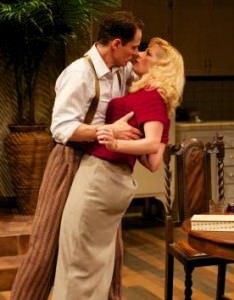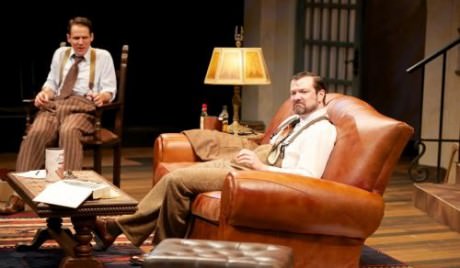Mark St. Germain’s new play Scott and Hem in the Garden of Allah, which was commissioned by The Contemporary American Theater Festival, is the sort of historical fiction that gets its thrust from our desire to peek between the curtains that celebrities have drawn across their windows, or that time itself has drawn. Its premise derives from historical fact: in July of 1937, while F. Scott Fitzgerald was living in Hollywood and working for Metro Goldwyn Mayer, his old friend Ernest Hemingway came to town to promote a documentary about the Spanish Civil War, which had begun the year before.

“Though there are conflicting reports about whether they actually got together when Hemingway came to Hollywood in ’37,” St. Germain told James McNeel, “I always thought that conversation would have been fascinating.” How might they have felt about meeting each other in those circumstances, and what might they have said? St. Germain tries to answer those questions by mixing historical data with components of the legends that surround both writers and details from his own imagination.
From the dramatic perspective, the play’s most interesting component is the motive for Hemingway’s visit: he has come to do Fitzgerald a favor.
“Listen, kid,” he says to Fitzgerald, who is three years his senior, “I still own the screen rights to my Kilimanjaro story.”
“No one would buy it?” Fitzgerald asks in surprise.
“Of course they’d buy it! Hunting, Africa, Hemingway, who wouldn’t? I didn’t
sell it,” Hemingway explains. “But you can.”
“I don’t understand.”
“Take it to Mayer. Tell him you own the rights. You want to produce it and write it.
The only writer. There’s your money and your ticket out.”
“What do you want from me?” Fitzgerald asks.
“Nothing!” Hemingway protests, in mock offense.
“I’ll ask again: what do you want?
“To help you!”
“Really,” Fitzgerald says. “Well, I suppose there’s a first time for everything.”
Ultimately, Hemingway admits that he wants Fitzgerald to explain how his wife lost her mind, step by step, with all the details a novelist might put on the page. At first he claims that he’s writing about a man who’s losing his mind, and he wants to get the details right, but ultimately Fitzgerald realizes that his friend really wants to compare the progress of Zelda’s mental illness with his own.
The other two sources of tension in the play are the facts that Hemingway’s career is burgeoning while Fitzgerald’s is faltering, and that Fitzgerald is staying sober, in compliance with his contract, while Hemingway is drinking harder than ever, perhaps to hide his mental illness. Those two circumstances may derive from historical fact, but the struggle to write doesn’t make for great drama; neither does the struggle not to drink.
David Barber’s set for this period piece offers an appealing, nostalgic glimpse of furnishings in the ice-box era, when phones were all attached to walls by cords, and Margaret McKowen’s costumes look authentic enough to make you wonder why anybody ever dressed like that. As Hemingway, Rod Brogan is forced to wear a tweed suit with pants that draw a midway line between his nipples and his navel. It looks like he’s supposed to look like a buffoon. Fitzgerald’s clothes fit better, and Joey Collins looks like he was born in them, but all that wool and all those layers make you glad the theater is air conditioned.

Collins’ performance is the best part of the play. He speaks in tight voice with an unidentifiable accent, which evokes Fitzgerald’s preoccupation with social class. And as the dialog moves away from jokes and wisecracks towards his wife and other matters that he cares about, somehow Collins’s cheeks get more and more hollow, his nostrils arch a little higher, and his eyes recede into his head until they almost disappear behind the intensity of his stare. He’s an excellent actor whose work at this festival gets better every year.
Scott and Hem in the Garden of Allah continues at The Contemporary American Theater Festival in Shepherdstown WV until July 28. For tickets, call 304-876-3473, or order them online.
Running Time: 90 minutes, with no intermission.
LINKS
Mark Dewey’s review of Scott and Hem Imagines Private Lives of Famous Writers at CATF.
Mark Dewey’s review of H20 at CATF.
Mark Dewey’s review of Heartless at CATF.
Mark Dewey’s review of Modern Terrorism: Laugh and Laugh and Tremble at CATF.
100 Plays Produced as CATF Kicks off Ambitious 23rd Season by Sydney-Chanele Dawkins.




